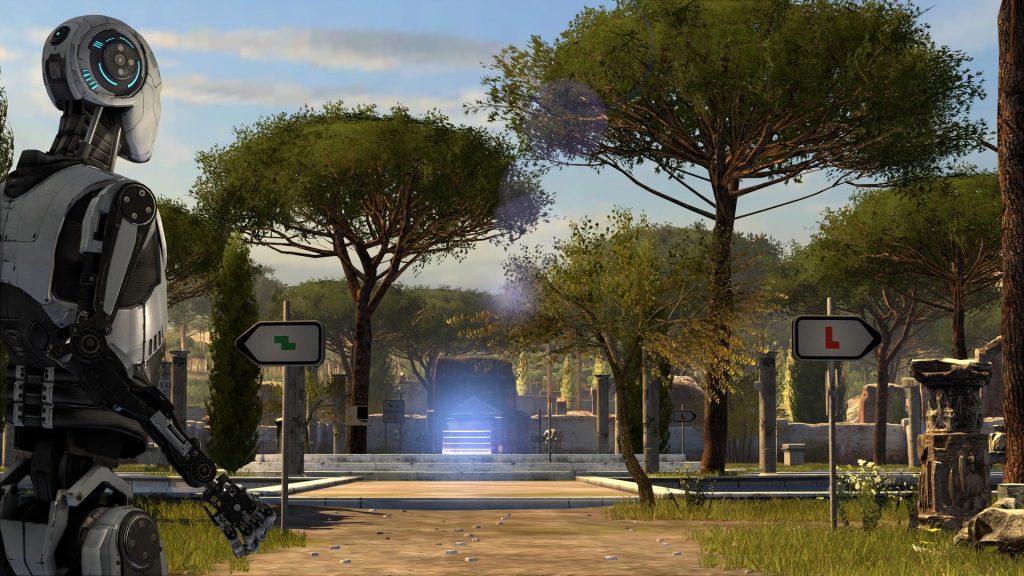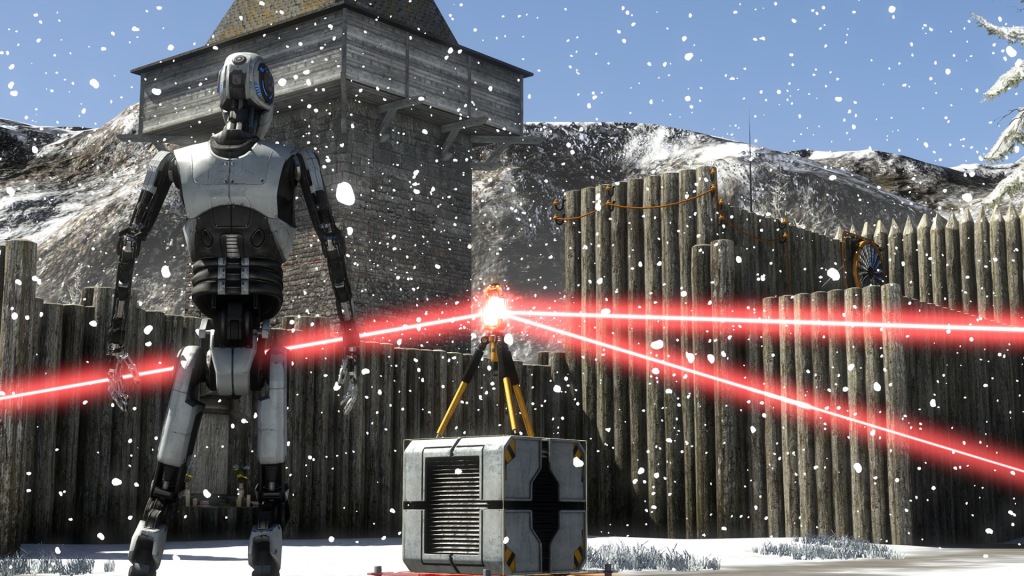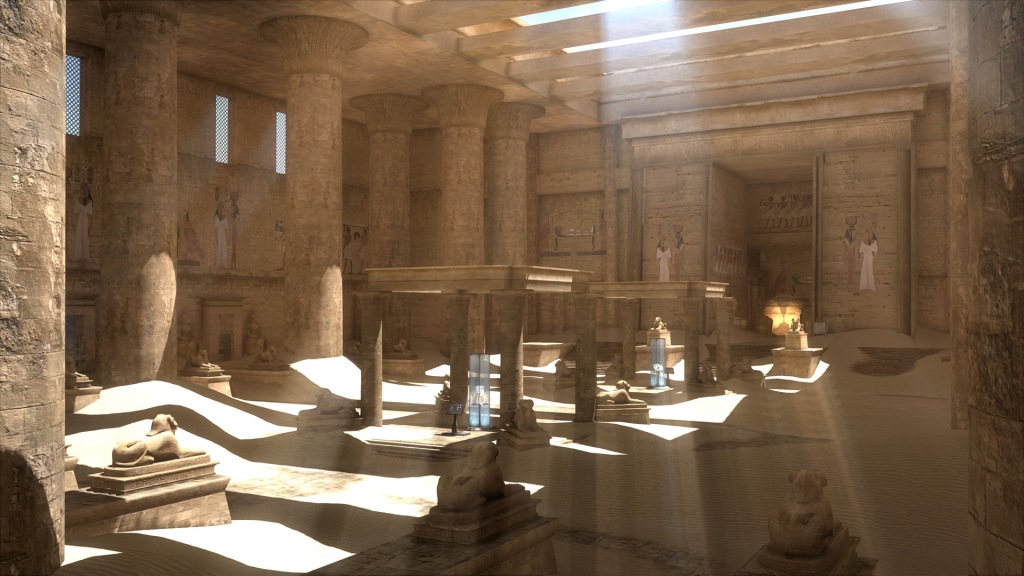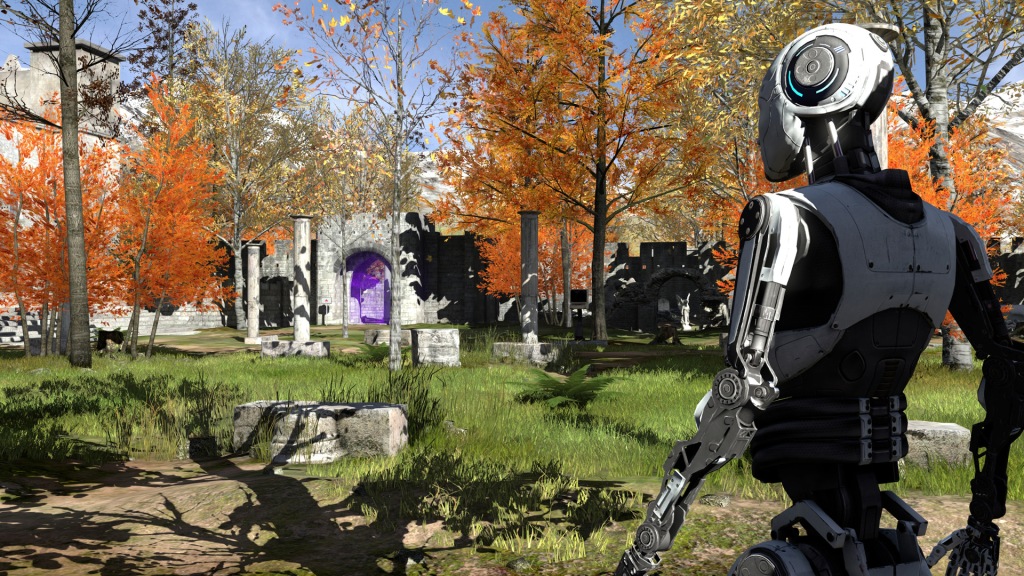Many games try and fail to meaningfully incorporate philosophical concepts. The Talos Principle is a puzzle game that is genuinely impressive in how it asks classical philosophy questions in a context in which they make sense. Philosophy always runs the risk of sounding pretentious, but The Talos Principle balances it masterfully. Puzzle games in general rarely have a story worth talking about, so I was pleasantly surprised with the unique approach that The Talos Principle took. It’s not the hardest puzzle game around, but I enjoyed how puzzles slowly ramped up in complexity while remaining approachable.

The Talos Principle begins when you come to life in what seems like Greek ruins. An omnipresent voice warmly regards you as his child, as he is Elohim. He is God. You have to solve his puzzles and stay on the path to achieve eternal life. But he warns you against ascending the tower that looms over the temples of this land. Aside from the occasional praises from Elohim, the only other signs of life are in the computer terminals as well as messages scrawled on the wall from those who came before you.
The computer terminals have a variety of texts. Some are excerpts from classic philosophy documents, some are random blog posts, and some are emails sent to and from a scientific institute. It quickly becomes clear that something catastrophic has happened to humanity, and you are in some sort of simulation that had been created by the aforementioned science team. An AI converses with you from the terminal, asking you questions about sentience, consciousness, humanity, free will, and other introspective musings.

I don’t think The Talos Principle tackles any new philosophical concepts, but it’s how the game presents these ideas which makes it intriguing. When you are confronted with the implication that you are a program in a simulation, it makes you think hard about what constitutes a human. You argue with the AI assistant at the computer terminals, debating the purpose of all of this and if you are truly human or not. Can a program ever achieve free will, or does it merely do as it’s told? Philosophy often borders on being pretentious, but The Talos Principle never felt like it was trying to show off how smart it was. It merely places you in the appropriate context to be confronted with these classic questions.
Aside from its philosophical elements, The Talos Principle is first and foremost a puzzle game. Each puzzle is almost like a maze filled with tools and obstacles. There are force fields, turrets, and moving minefields that prevent you from reaching your goal. You are given an arsenal of tools such as jammers, cubes, and laser reflectors to assist you open up pathways. The puzzle design frequently relies heavily on spatial reasoning and order of operations. As you get further and further into the game, the number of tools and obstacles grows such that you have to perform dozens of steps to complete a single puzzle.

A technique that I noticed while playing was that no matter how elaborate a puzzle got, the first step was always obvious. The game rarely gives you more than one object to interact with right away, so you know what to do first. This is clever because it makes the puzzles far less intimidating when you are making progress. Even if all you did was connect two dots, that’s still a step towards the solution. I never truly felt like I was stuck and I never got frustrated because The Talos Principle makes sure its puzzles are segmented into smaller, easier puzzles. And putting the pieces all together at the end is immensely satisfying.
Another interesting aspect of the game’s puzzle design is how deceptive it often is. You learn tricks and gain habits as you play, only for the game to turn those against you. You may see a force field that seems like you need to use a laser to open it, but there’s no feasible way to get a laser in that spot. Or you may think that you need two laser reflectors to get around a couple corners, but really there’s a specific angle that you need to place the reflector at. As I previously mentioned, none of the puzzles felt overwhelmingly difficult, but they do make you feel smart when you catch on to their tricks.

While I did enjoy the standard puzzles in The Talos Principle, there were two other types of puzzles that I loathed. The first type being sigil puzzles. As you solve a regular puzzle, you are rewarded with a sigil, which is a block shaped sort of like a Tetris piece. When you collect enough sigils, you can use them to open doors. You have to fit the pieces together into a perfect rectangle. It’s simple enough, and most of the time isn’t too difficult. But towards the end of the game there are some sigil puzzles leading to secret areas that require you to fit a dozen or so pieces together. I never found a reliable way to solve these puzzles, and mostly relied on just guessing or using intuition. Sure, you learn which pieces fit nicely together as you play, but it’s annoyingly time consuming to just slap pieces together and pray that it works out.
The second variety of groan-inducing puzzles are the secret stars. There are 30 secret stars hidden throughout the game, and collecting enough of them grants you access to bonus areas. Truthfully, I quite enjoy the puzzle portion of collecting most of these. They usually require some outside-the-box thinking, like stacking boxes to go outside the boundaries of a puzzle or using a laser from one puzzle to open a gate in another one. The issue with the secret stars is finding them. They are often hidden in completely obscure locations with little to no hints of their whereabouts. I want to solve puzzles, not run around in circles looking for a corner that might have a secret in it.

Fortunately, both the secret stars and sigil puzzles are only minor aspects of the game. Sigil puzzles are usually fairly simple and the stars can be ignored altogether. The bulk of The Talos Principle is in its standard puzzles and in its philosophical ponderings, both of which are excellent. It’s rare to come across a game that doesn’t make philosophy feel forced and pretentious, but The Talos Principle excels at asking questions in an organic manner. The puzzles never wowed me with grand revelations, but I found them to be addictive in their simplicity. As a lover of puzzle games, I can’t believe that I put off playing The Talos Principle for so long. If you enjoy puzzle games, you owe it to yourself to play The Talos Principle.